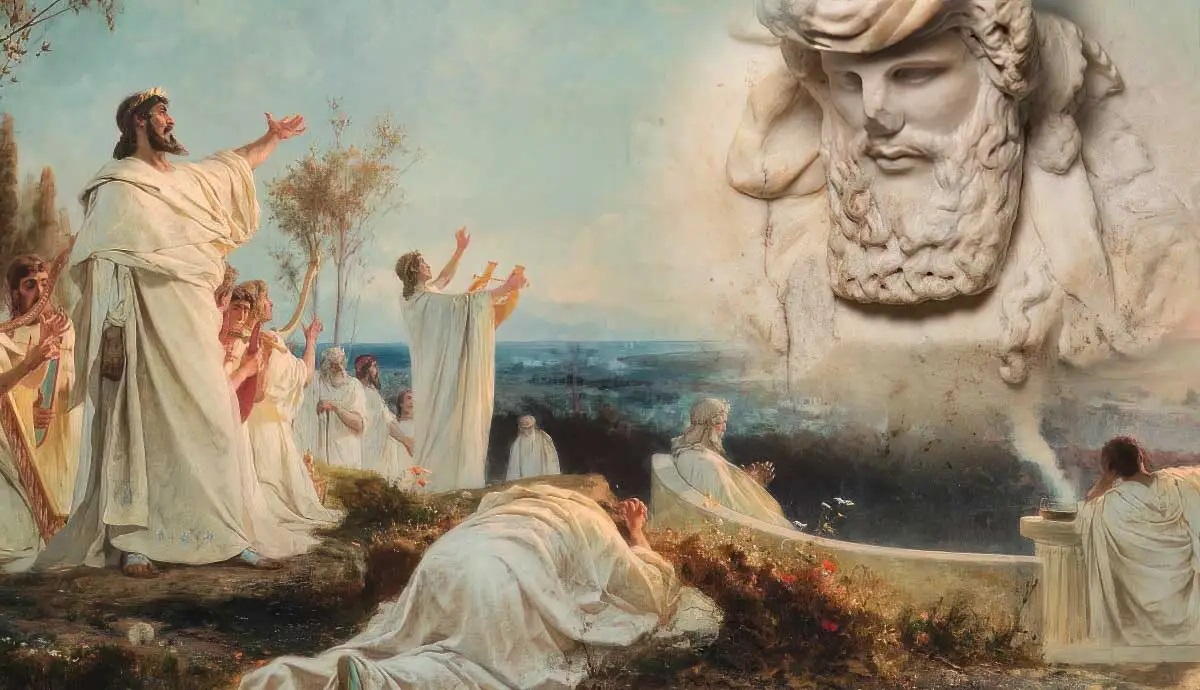
Ancient Greece's religion, steeped in mythology and rituals, played a pivotal role in shaping the culture and daily life of its people. Ancient Greek religion was polytheistic, meaning worshippers believed in multiple gods and goddesses, each embodying various aspects of life and nature. From the mighty Zeus, king of the gods, to Athena, goddess of wisdom and warfare, these deities influenced everything from political decisions to personal conduct. Temples dedicated to these gods dotted the landscape, serving as centers of worship and community gatherings. Festivals and sacrifices were common, ensuring the gods' favor and goodwill. Understanding these 18 facts about ancient Greek religion offers a window into the values, fears, and aspirations of one of history's most influential civilizations.
The Pantheon of Gods
Ancient Greece had a rich tapestry of gods and goddesses, each with unique stories and attributes. These deities played crucial roles in the daily lives of the Greeks.
-
Zeus was the king of the gods, ruling from Mount Olympus. He wielded thunderbolts and was known for his numerous affairs with both goddesses and mortal women.
-
Hera, Zeus's wife, was the goddess of marriage and childbirth. Despite her role, she was often depicted as jealous and vengeful due to Zeus's infidelities.
-
Poseidon, brother of Zeus, ruled the seas. He carried a trident and was known for causing earthquakes, earning him the nickname "Earth-shaker."
-
Athena, born from Zeus's head fully armed, was the goddess of wisdom and warfare. She was also the patroness of Athens, which was named in her honor.
-
Apollo, god of the sun, music, and prophecy, was known for his beauty and artistic talents. He was also a healer and could bring disease with his arrows.
Religious Practices and Rituals
The Greeks practiced various rituals to honor their gods, believing these acts would ensure their favor and protection.
-
Sacrifices were a common practice, often involving animals like sheep, goats, or bulls. These sacrifices were believed to please the gods and ensure their blessings.
-
Festivals were held in honor of different gods. The most famous was the Olympic Games, held every four years in Olympia to honor Zeus.
-
Oracles played a significant role in decision-making. The Oracle of Delphi, dedicated to Apollo, was the most famous, where priestesses would deliver cryptic predictions.
-
Temples were built as homes for the gods. Each city-state had its own patron deity and corresponding temple, like the Parthenon in Athens for Athena.
Mythological Tales
Greek mythology is filled with fascinating stories that explain natural phenomena, human behavior, and the origins of the gods.
-
The Iliad and The Odyssey, epic poems by Homer, tell the stories of the Trojan War and the adventures of Odysseus. These tales are central to Greek mythology and culture.
-
Prometheus was a Titan who defied Zeus by giving fire to humanity. As punishment, he was chained to a rock where an eagle would eat his liver daily, which would regenerate each night.
-
Pandora, the first woman, was created by the gods and given a box (or jar) containing all the world's evils. When she opened it, she released these evils, leaving only hope inside.
Influence on Daily Life
Religion in ancient Greece was intertwined with daily activities, influencing everything from politics to personal decisions.
-
Household Altars were common, where families would offer daily prayers and small sacrifices to household gods like Hestia, goddess of the hearth.
-
Naming Ceremonies for children often involved dedicating the child to a particular god or goddess, seeking their protection and favor throughout the child's life.
-
Agricultural Practices were closely linked to religious beliefs. Farmers would pray to Demeter, goddess of the harvest, for bountiful crops and good weather.
Legacy of Ancient Greek Religion
The influence of ancient Greek religion extends far beyond its time, impacting modern culture, literature, and even language.
-
Mythological References are common in modern literature, art, and film. Characters like Hercules and events like the Trojan War continue to captivate audiences.
-
Philosophical Ideas from ancient Greece, such as those from Socrates, Plato, and Aristotle, were deeply intertwined with religious beliefs and have shaped Western thought.
-
Language has been influenced by Greek mythology, with terms like "Achilles' heel" and "titanic" deriving from these ancient stories.
Piecing Together Ancient Beliefs
Diving into ancient Greece's religious practices offers a fascinating glimpse into a world where gods and mortals intertwined in daily life. From the grandeur of Mount Olympus to the depths of the Underworld, these beliefs shaped not just rituals but the very fabric of Greek society. Festivals, temples, and myths weren't just for show; they were integral to understanding the universe's workings and humans' place within it. Reflecting on these facts, we see a civilization deeply connected to its gods, seeking their guidance through oracles and paying homage with elaborate ceremonies. This exploration into ancient Greek religion reveals a complex, nuanced tapestry of faith that continues to intrigue and inspire today, reminding us of humanity's eternal quest to find meaning in the cosmos.
Was this page helpful?
Our commitment to delivering trustworthy and engaging content is at the heart of what we do. Each fact on our site is contributed by real users like you, bringing a wealth of diverse insights and information. To ensure the highest standards of accuracy and reliability, our dedicated editors meticulously review each submission. This process guarantees that the facts we share are not only fascinating but also credible. Trust in our commitment to quality and authenticity as you explore and learn with us.


